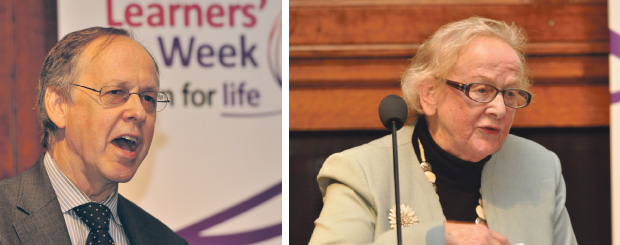TV presenter Philippa Forrester enthusiastically kicked off the ceremony.
“There’s a reason for all these balloons, all these candles, all these flowers,” said the host.
“This is a celebration. This is a party. This is to say well done. To acknowledge all of that work and the bravery.”
This is the 21st year of Adult Learning Week and the chief executive of NIACE, David Hughes, described the ceremony as the “pinnacle” of what happens.
There will be around 4,000 ‘Have a Go’ events across the country and Mr Hughes said the week will give around 100,000 people the opportunity to get back into learning.
Congratulatory words from David Cameron were read out by the chief executive. The Prime Minister described adult learning as “part of this country’s lifeblood”.
Whilst presenting Tomorrow’s World, Ms Forrester studied Ecology and Conservation at Birkbeck College in London, and she spoke about the “excitement” of returning to education as an adult.
This is a celebration. This is a party. This is to say well done. To acknowledge all of that work and
the bravery”
The Business Secretary Vince Cable similarly drew on personal experiences and talked about his mother, who left school at 15 to work in a factory packing chocolates.
“The stress of being ambitious and able, but the lack of education opportunity, meant that when I was about 10 or 11, she had a very serious nervous breakdown,” he said.
“She eventually put her life together again through adult education, so I shall always be pleasantly indebted to the people who made that possible.”
The first winner to be presented with their award was Corina Scanlan-Messam.
After leaving school, which she says she “hated” and gained just two GCSE’s at, she became involved in drugs and petty crime.
When she discovered she was pregnant at 21, she said she knew she needed to give her child a “better life” and enrolled at South Cheshire College.
There she completed a Moving On course, taking only two weeks maternity leave.
She cites the emotional, as well as academic support, given to her by her tutor Alison Fenoglio, as a massive help. She said Ms Fenoglio, who nominated her, is like a “friend”.
In September she will begin a degree in Psychology at Keele University with the hope of going on to study a masters in forensic psychology. “I feel like I’ve set myself free,” she said.
Adult Learner Award winner stories
Inspiring words were heard from learners and teachers throughout the ceremony, with 70 individuals and seven organisations presented with awards – here are some of their stories.
Apprentice of the Year
Aysha Bentley, 21, said that thanks to her placement at the De Vere Academy of Hospitality she went “from facing jail and being homeless, to meeting new people, learning skills, having qualifications and committing myself to something I love.”
After only 12 weeks of her apprenticeship she won third place at the national De Vere Academy competition. She now has two jobs, working in the kitchen of a pub and a luxury five-star fitness centre.
Outstanding Learner of the Year
Tash Young, 28, left school with two GCSE’s and began working in unskilled jobs. She felt unfulfilled and slipped into depression, losing her job and spending the next ten years claiming benefits. Her mother suggested that she tried volunteering. “It was one of the best decisions I have ever made,” she said. Having completed a number of courses at the Volunteer Centre Babergh she has been offered a permanent position as an assistant volunteer coordinator with The Befriending Scheme.
National Senior Learner
Alan Markland, 78, worked in the navy for 37 years, but had to leave after being diagnosed with asbestosis.
After ending his 15 year struggle with alcoholism he embarked on a degree in Creative Writing at Bolton University. He has published a collection of short stories, completed a novel and is currently working on a play. “I have learned as I have gone and the lessons, often heart-breaking, more often uplifting, continue,” said Alan.
Learning Works award
Karen King, 42, found working as a carpenter in a male-dominated environment a challenge, with her uniform not fitting and problems accessing toilets when off-site. She joined the Union of Construction, Allied Trades and Technicians (UCATT) to find out about her rights and then took courses to become a health and safety representative. This led to her teaching sessions on the subject and she is now also a UCATT Learning Rep. “These achievements have transformed my life,” she said.


